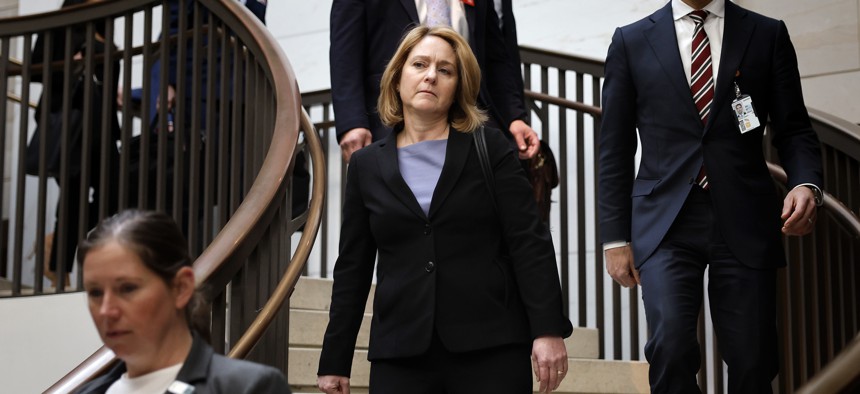Pentagon official says US values will outcompete Beijing in AI

Deputy Defense Secretary Kathleen Hicks arrives for a closed-door briefing with senators about the Discord leaks at the U.S. Capitol Visitors Center on April 19, 2023 in Washington, DC. Hicks stressed the importance of American values in international AI competition during a March 5, 2023 event. Chip Somodevilla/Getty Images
The U.S. continues to lead the global AI arms race with China “because it's powered by a free and open society, committed to responsible-use values and ideals,” according to Deputy Secretary of Defense Kathleen Hicks.
The U.S. and China are on diverging paths when it comes to adopting emerging technologies like artificial intelligence, necessitating that the Pentagon move quickly “to deliver a more modernized, data-driven and AI-empowered military now” to counter Beijing’s growing deployment of the advanced tools, according to a top Defense official.
During remarks at a Tuesday conference hosted by the Global National Security Institute, Deputy Secretary of Defense Kathleen Hicks said the U.S. and China “take different approaches” to using AI tools, with America taking one that “reflects our ethics and democratic values.”
“For instance, even as we're swiftly and safely embedding AI into many aspects of our mission — from battlespace awareness, cyber and reconnaissance, to logistics, force support and other back-office functions — we do so mindful of AI's potential dangers, which we're determined to avoid,” Hicks said, adding “that's why we always have a human responsible for the use of force.”
Hicks said the U.S. innovation ecosystem remains a global leader “because it's powered by a free and open society, committed to responsible-use values and ideals.” In contrast to Beijing, she said U.S. officials and the government also “don't use data and AI to censor, repress or disempower people — just as we don't seek to control innovation or make it toe the party line.”
“In this era of strategic competition with the [People's Republic of China], the advantage will always go to the country that uses AI and associated technologies better, faster, smarter and safer,” Hicks said. “Today, that's Team USA. We have better chips, better talent, better schools, better tech, better allies and values that guide how we use data and AI, and we intend to stay in the lead.”
The Biden administration and Congress have taken steps in recent years to enhance domestic tech production as a counterweight, in part, to China’s global ambitions. The 2022 CHIPS and Science Act directed billions of dollars toward domestic chip manufacturers to help the U.S. enhance its global share of chip production, which has increasingly lagged behind a host of nations across the Indo-Pacific over the past several decades.
State Department officials have also been engaging with other nations — including China — to develop global guidance around the use and deployment of powerful AI tools to limit the technologies’ broader societal impact. And lawmakers have introduced bipartisan legislation that would push the U.S. to take more of a leading role in international discussions surrounding the development of AI standards to help limit China’s role in crafting the guidance.
But these steps alone will not restrict China’s tech intentions. Echoing language in the 2022 National Defense Strategy — which referred to Beijing as “the pacing challenge for the department” — Hicks warned that China is the only nation “with the will and increasingly the wherewithal to remake the international order” that has benefited the U.S.
She added that “our competitors will always be dynamic and try to leap ahead by stealing technology and intellectual property,” requiring enhanced collaboration between the government and academics, educational institutions, technologists, allied nations and other partners to continue driving U.S.-led innovation moving forward.
U.S. officials have frequently criticized Beijing and its cyber actors for stealing sensitive IP from private companies and then using it to further the government’s tech ambitions. To secure critical emerging technologies from theft and exploitation, the U.S. government has imposed export controls to limit China’s access to advanced semiconductors and other sensitive data and has worked with allied nations and firms to limit forced tech transfers.
“It's all-hands-on-deck, because our lead is never guaranteed,” Hicks said about the U.S.’s efforts to maintain its tech advantage over China. “We have to earn it constantly.”



